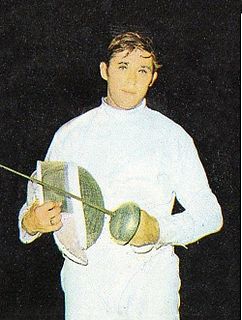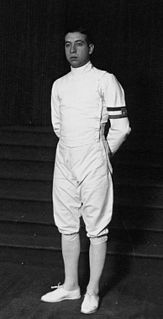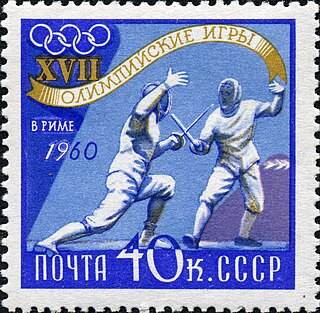
The men's foil was one of eight fencing events on the fencing at the 1964 Summer Olympics programme. It was the fourteenth appearance of the event. The competition was held from October 13 to October 14, 1964. 55 fencers from 21 nations competed. Nations had been limited to three fencers each since 1928. The event was won by Egon Franke of Poland, the nation's first victory in the men's foil. France returned to the podium after a one-Games absence, with Jean-Claude Magnan taking silver and Daniel Revenu the bronze.

The men's épée was one of eight fencing events on the fencing at the 1964 Summer Olympics programme. It was the fourteenth appearance of the event. The competition was held from October 18 to 19 1964. 65 fencers from 25 nations competed. Each nation was limited to three fencers. The event was won by Grigory Kriss of the Soviet Union, the nation's first gold medal in the event after a bronze four years earlier. The Soviets also took bronze, with Guram Kostava finishing in third place. Between the two was silver medalist Bill Hoskyns of Great Britain; it was the second consecutive Games with a British silver medalist in the event. Italy's six-Games gold medal streak in the men's individual épée ended with the nation missing the podium entirely; Gianluigi Saccaro finished fourth after losing the bronze-medal barrage to Kostava.

The men's épée was a fencing event held as part of the Fencing at the 1912 Summer Olympics programme. It was the fourth appearance of the event, which had been introduced in 1900. The competition was held from 11 to 13 July at the Östermalm Athletic Grounds. There were 93 competitors from 15 nations. Each nation could enter up to 12 fencers. The event was won by Paul Anspach of Belgium. His countryman Philippe le Hardy took bronze. Silver went to Denmark's Ivan Joseph Martin Osiier, the only medal won by the perennial Olympian who competed in seven Games over 40 years. The medals were the first in the men's épée for both nations.

The men's épée was a fencing event held as part of the fencing at the 1920 Summer Olympics programme. It was the fifth appearance of the event. A total of 80 fencers from 13 nations competed in the event, which was held from August 20 to 23, 1920. Each nation was limited to eight fencers, down from 12 in 1908 and 1912. Of the six fencing events, the only one in which Nedo Nadi did not win a gold medal was the one in which he did not compete. Instead, a trio of Frenchmen swept the medals. It was Lippmann's second silver medal in the event, he having previously taken second in 1908; he was the second man to win multiple medals in the individual épée.

The men's foil was one of seven fencing events on the Fencing at the 1924 Summer Olympics programme. It was the sixth appearance of the event, which had not been on the programme in 1908. The competition was held from Monday July 1, 1924, to Thursday July 4, 1924. 49 fencers from 17 nations competed. Nations were limited to four fencers each, down from eight in 1920. The event was won by Roger Ducret of France, the nation's third victory in the men's foil. His countryman Philippe Cattiau finished second for the second consecutive Games; Cattiau and Ducret became the second and third men to win multiple medals in the event. Maurice Van Damme earned Belgium's first medal in the men's foil with his bronze.
The men's épée was one of seven fencing events on the Fencing at the 1924 Summer Olympics programme. It was the sixth appearance of the event, which had not been on the programme in 1896. The competition was held from Wednesday, July 10, 1924 to Thursday, July 11, 1924. 67 fencers from 18 nations competed. Nations were limited to four competitors each. The event was won by Charles Delporte of Belgium, the nation's second victory in the individual épée. Silver went to Roger Ducret of France. Nils Hellsten earned Sweden's first medal in the event with his bronze.

The men's épée was one of seven fencing events on the Fencing at the 1928 Summer Olympics programme. It was the seventh appearance of the event. The competition was held from 6 August 1928 to 7 August 1928. 59 fencers from 22 nations competed. Each nation could have up to three fencers. The event was won by Lucien Gaudin of France, the nation's third victory in the individual men's épée—taking sole possession of most among nations above Cuba and Belgium, each at two. Gaudin was the second man to win both the foil and épée events at a single Games. It was the third consecutive Games at which France reached the podium in the event. Two Frenchman had reached the head-to-head final; Gaudin won over Georges Buchard, who received silver. Bronze in 1928 went to American George Calnan, the nation's first medal in the event.

The men's sabre was one of seven fencing events on the Fencing at the 1928 Summer Olympics programme. It was the eighth appearance of the event. The competition was held from 10 August 1928 to 11 August 1928. 44 fencers from 17 nations competed. For the third straight Games, the limit of fencers per nation was reduced. The event was won by Ödön von Tersztyánszky of Hungary, the second in a nine-Games streak of Hungarian wins. Attila Petschauer, also of Hungary, took silver. Italy's Bino Bini earned bronze.

The men's épée was one of seven fencing events on the fencing at the 1932 Summer Olympics programme. It was the eighth appearance of the event. The competition was held from 8 August 1932 to 9 August 1932. 28 fencers from 12 nations competed, with three others entered but not starting. A maximum of three fencers per nation could compete. The event was won by Giancarlo Cornaggia-Medici of Italy, with his countryman Carlo Agostoni taking bronze. They were the first medals for Italy in the men's individual épée. France reached the podium for the fourth consecutive Games in the event with Georges Buchard's silver. Buchard was the third man to win multiple medals in the event, repeating his second-place finish from 1928.

The men's foil was one of seven fencing events on the fencing at the 1932 Summer Olympics programme. It was the eighth appearance of the event. The competition was held from 2 to 4 August 1932. 26 fencers from 12 nations competed, with one other entered but not starting. Each nation was limited to three fencers. The event was won by Gustavo Marzi of Italy, the nation's third victory in the men's foil. His countryman Giulio Gaudini took bronze for the second consecutive Games, becoming the fourth man to win multiple medals in the event. Joe Levis gave the United States its first men's foil medal with his silver.

The men's sabre was one of seven fencing events on the fencing at the 1932 Summer Olympics programme. It was the ninth appearance of the event. The competition was held from 12 August 1932 to 13 August 1932. 25 fencers from 12 nations competed. Five additional fencers entered but did not start. Each nation was limited to three fencers. The event was won by György Piller of Hungary, the third of nine straight Games in which a Hungarian would win the event. Giulio Gaudini of Italy took silver, while another Hungarian earned bronze.

The men's foil was one of seven fencing events on the fencing at the 1936 Summer Olympics programme. It was the ninth appearance of the event. The competition was held from 5 August 1936 to 6 August 1936. 62 fencers from 22 nations competed. Nations were limited to three fencers. The event was won by Giulio Gaudini of Italy, the nation's second consecutive and fourth overall victory in the men's foil. Gaudini, who had won bronze medals in 1928 and 1932, was the first man to win three medals in the event. His countryman Giorgio Bocchino took bronze. Edward Gardère put France back on the podium after a one-Games absence.

The men's sabre was one of seven fencing events on the fencing at the 1936 Summer Olympics programme. It was the tenth appearance of the event. The competition was held from 14 August 1936 to 15 August 1936. 71 fencers from 26 nations competed. Nations were limited to three fencers each. The event was won by Endre Kabos of Hungary, the fourth of nine straight Games in which a Hungarian would win the event. Kabos became the second man to win multiple medals in the individual sabre, adding to his 1932 bronze. Gustavo Marzi of Italy took silver, while Hungarian Aladár Gerevich earned bronze.

The men's foil was one of seven fencing events on the fencing at the 1948 Summer Olympics programme. It was the tenth appearance of the event. The competition was held from 3 August 1948 to 4 August 1948. 63 fencers from 25 nations competed. The event was won by Jehan Buhan of France, the nation's first victory in the men's foil since 1928 and fifth overall. His countryman Christian d'Oriola took silver, while Lajos Maszlay earned Hungary's first medal in the men's individual foil with his bronze.

The men's épée was one of seven fencing events on the fencing at the 1952 Summer Olympics programme. It was the eleventh appearance of the event. The competition was held from 27 July 1952 to 28 July 1952. 76 fencers from 29 nations competed. Nations were limited to three fencers each. The event was won by Edoardo Mangiarotti of Italy, the nation's fourth consecutive victory in the men's épée. It was also the fourth consecutive year that Italy had at least two fencers on the podium in the event, as Edoardo's brother Dario Mangiarotti took silver. Bronze went to Oswald Zappelli of Switzerland. Zappelli and Edoardo Mangiarotti had faced each other in a barrage for silver and bronze medals in 1948, which Zappelli had won; the two men were the fifth and sixth to earn multiple medals in the event.

The men's foil was one of seven fencing events on the fencing at the 1952 Summer Olympics programme. It was the eleventh appearance of the event. The competition was held from 23 July 1952 to 24 July 1952. 61 fencers from 25 nations competed. All three medallists were left-handed. Nations were limited to three fencers each since 1928. The event was won by Christian d'Oriola of France, the nation's second consecutive victory in the men's foil and sixth overall. D'Oriola was the fifth man to win multiple medals in the event. The silver and bronze medals were won by Edoardo Mangiarotti and Manlio Di Rosa of Italy.

The men's sabre was one of seven fencing events on the fencing at the 1952 Summer Olympics programme. It was the twelfth appearance of the event. The competition was held from 31 July 1952 to 1 August 1952. 66 fencers from 26 nations competed. Nations were limited to three fencers each. The event was won by Pál Kovács, the sixth of nine straight Games in which a Hungarian would win the event. Kovács became the fourth man to win multiple medals in the individual sabre, adding to his 1948 bronze. Hungary swept the medals in the event for the second time. Aladár Gerevich's silver completed a set of three different color medals in the event, the first man to win three medals in individual sabre. Tibor Berczelly earned bronze.

The men's foil was one of seven fencing events on the fencing at the 1956 Summer Olympics programme. It was the twelfth appearance of the event. The competition was held on 26 November 1956. 32 fencers from 14 nations competed. Nations had been limited to three fencers each since 1928. The event was won by Christian d'Oriola of France, the second man to successfully defend an Olympic title in the foil and second man to win three medals in the event. It was France's third consecutive and seventh overall victory in the event. As in 1952, the next two spots were taken by Italians, this time Giancarlo Bergamini and Antonio Spallino.

The men's épée was one of seven fencing events on the fencing at the 1956 Summer Olympics programme. It was the twelfth appearance of the event. The competition was held on 30 November 1956. 41 fencers from 18 nations competed. Nations were limited to three fencers each. The event was won by Carlo Pavesi of Italy, the nation's fifth consecutive victory in the men's épée. In all five of those Games, Italy earned at least two medals in the event; this was the second sweep during that period for Italy. Giuseppe Delfino was the silver medalist while Edoardo Mangiarotti took bronze. It was Mangiarotti's third medal in the event, along with gold in 1952 and another bronze in 1948; he was the first man to win three medals in the individual épée.

The men's foil was one of eight fencing events on the fencing at the 1960 Summer Olympics programme. It was the thirteenth appearance of the event. The competition was held from 29 – 30 August 1960. 78 fencers from 31 nations competed. Nations had been limited to three fencers each since 1928. The event was won by Viktor Zhdanovich of the Soviet Union, with his countryman Yury Sisikin the runner-up; they were the nation's first medals in the event. The Soviets nearly swept the medals, with Mark Midler advancing to a three-man barrage for third place before finishing in fifth place. Albie Axelrod's bronze put the United States on the podium for the event for the first time since 1932. Traditional powers Italy and France, who between them had won 11 of 12 gold medals and 9 of 12 silver, were kept off the podium entirely.



















